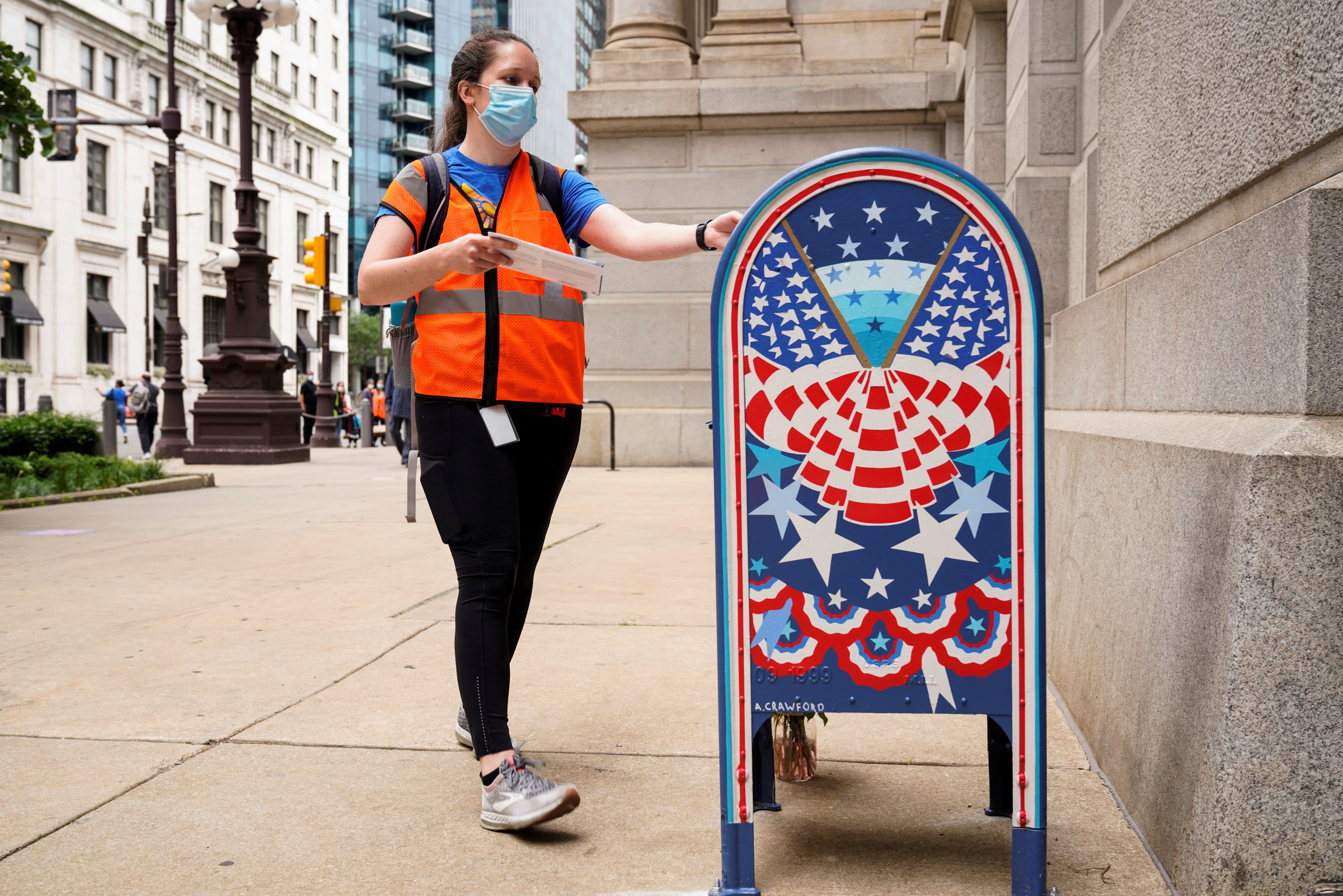
A woman wearing a mask to prevent the spread of coronavirus disease (COVID-19) casts her ballot in the primary election in Philadelphia, Pennsylvania, June 2, 2020.
Joshua Roberts | Reuters
The Pennsylvania Supreme Court on Thursday extended the state’s absentee ballot deadline and approved of the use of mail-in ballot drop boxes, giving Democrats a win in the battleground state.
The case, which was brought by the Pennsylvania Democratic Party, is similar to another one being litigated in federal court, which was put on pause while the state’s supreme court considered the matter. The federal case, essentially a reverse of the state case, was brought by President Donald Trump’s reelection campaign and the Republican National Committee.
Battles over voting rules have taken on a heightened significance amid the Covid-19 pandemic, which has forced states to adjust to millions more voters casting ballots by mail.
The legal fight in Pennsylvania is particularly fierce, given the state’s role in possible paths to victory for Trump and former Vice President Joe Biden, the Democratic nominee. Trump won the state in 2016, marking the first Republican victory there in a presidential race since 1988.
The state supreme court’s ruling pushed the deadline for receiving absentee ballots to Nov. 6, or three days after Election Day, if they are postmarked by 8 p.m. on Nov. 3. It also held that the election code permitted drop boxes for submitting mail-in ballots.
The previous deadline for receiving absentee ballots was 8 p.m. on Election Day, but Democrats argued that enforcing that deadline would lead to widespread voter disenfranchisement given the pandemic and delays with the United States Postal Service.
The court also agreed with Democrats that a state requirement that poll watchers live in the county where they serve is constitutional.
The court ruling, authored by Justice Max Baer, did contain some bad news for Democrats. It rejected their argument that election boards should have to notify voters whose ballots contained minor defects to allow them to “cure” the errors.
The court also rejected the argument from Democrats that so-called “naked ballots,” or those that are submitted with no outer envelope shielding the ballot, should be counted.
“Whatever the wisdom of the requirement, the command that the mail-in elector utilize the secrecy envelope and leave it unblemished by identifying information is neither ambiguous nor unreasonable,” Baer wrote for the court’s majority.
Following the ruling, both sides claimed partial victories. Marc Elias, a lawyer fighting on behalf of the Democratic Party in a number of suits around the country, said on Twitter that the ruling was a “a very good result for those of us fighting for voting rights.”
Trump took to Twitter to cheer the win for Republicans on ballot curing, and touted a separate case, also decided Thursday by the Pennsylvania Supreme Court, that rejected a request by four retired Pennsylvania voters to allow for third-party assistance in returning their mail-in ballots. Trump has labeled the practice ballot “harvesting,” although others call it ballot collection.
“Waiting for the BIG Federal decisions in Pennsylvania, Nevada, and elsewhere!” he wrote.
The federal judge overseeing the Pennsylvania case, District Judge J. Nicholas Ranjan, is a Trump appointee. In his August opinion temporarily halting the case, Ranjan said he would “apply the brakes” to the lawsuit until state courts could weigh in.
The relevant state election law was passed in 2019, Ranjan wrote, meaning that until this case no Pennsylvania state court had interpreted the provisions at issue. But, he said, the pause did not mean he was abdicating his responsibility in deciding any potential constitutional or federal questions that were presented.
In a third case decide by the Pennsylvania Supreme Court on Thursday, the court ruled that Green Party candidate Howie Hawkins will not appear on the state’s ballots because of problems with his election paperwork. The ruling cleared the way for the state to begin mailing out absentee ballots.




